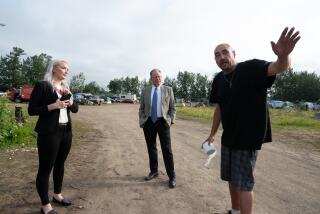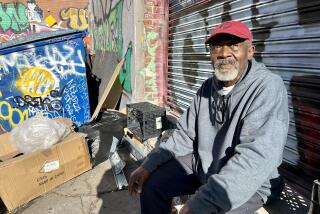Rattled Without His Home, Medicine or Money
- Share via
OLYMPIA, Wash. — On his first morning of homelessness Thursday, Allion Brewer had 9 cents, an expired bus pass and none of his medications--struggling to restart his life after a major earthquake centered near this state capital forced him and 52 others to flee their low-income apartment building.
It didn’t go well.
Postal workers, whose main building was closed because of quake damage, couldn’t immediately check whether the state vouchers for his medicine had come in.
His credit union, also shuttered, couldn’t confirm whether his $550 monthly state disability payment had been deposited.
And a Wells Fargo cash machine wasn’t working either, blinking the message: “We’re sorry. Your request cannot be processed at this time.”
“Disgusting,” snapped Brewer, 61, who retired two years ago--the victim of several heart attacks. “This is terrible. I gotta buy a bus pass. I gotta get my medicine. What am I supposed to do?”
So it went Thursday for Brewer and other residents of Olympia, located 11 miles from the quake’s epicenter, as they assessed the damage to their homes, businesses and lives.
Red Cross officials said they were discovering more damage here than had been immediately apparent following Wednesday’s quake as reports of power outages, broken water pipes and other problems trickled in. On the capital’s main road, many businesses were shut down, fenced in and sealed off with yellow tape.
At Gloria Dei Lutheran Church, where the Red Cross set up an emergency shelter for Brewer and 20 others, volunteers scrambled to find lost pets, temporary housing and needed medications. Nurses and mental health professionals also were on hand to help with medical and emotional problems.
All of the evacuees were limited-income or disabled residents of the Olympian apartments, a 1920s structure near the Capitol dome that was converted into subsidized housing two decades ago. After the quake caused major structural damage to the building, about half the tenants moved to the shelter, where they were given toiletry kits, a spaghetti dinner and cots to sleep on.
Uncertainty hung over them like a thick Northwest fog.
To while away the time, the evacuees played cards, watched videos and told and retold their stories.
They spoke of fear and panic, of cats and dogs and fish left behind, of potentially lost priceless personal possessions. For Larry Fox--a 60-year-old minister disabled by five heart attacks and a stroke--his five Bibles, marked in the margins with a lifetime of notes, would be irreplaceable.
Swapping stories, the evacuees also learned they shared a key worry: whether they would be able to find replacement housing at current subsidized rates of about $150 a month.
“I have no place to go,” said Fox, “and I’m too old to start over.”
The companionship and cathartic sharing of woes is, experts say, a crucial part of the disaster recovery process.
“More than anything else, shelters provide an opportunity for people to tell their stories and talk about their fears,” said Jason Smith, a Red Cross disaster relief worker.
As for Brewer--the bearded and bespectacled former apartment manager--his bad luck began to change later Thursday. He went to his pharmacy, hoping to beg them for an advance on his medicine until the banks were back in business.
No problem. The Red Cross had called, guaranteeing payment.
Brewer cracked his first smile of the day.
“Well,” he said, “things are getting better.”
More to Read
Sign up for Essential California
The most important California stories and recommendations in your inbox every morning.
You may occasionally receive promotional content from the Los Angeles Times.














